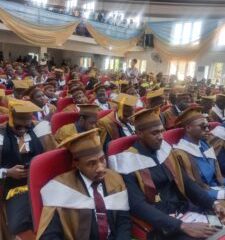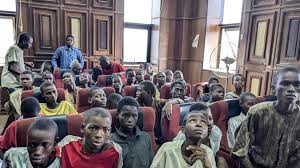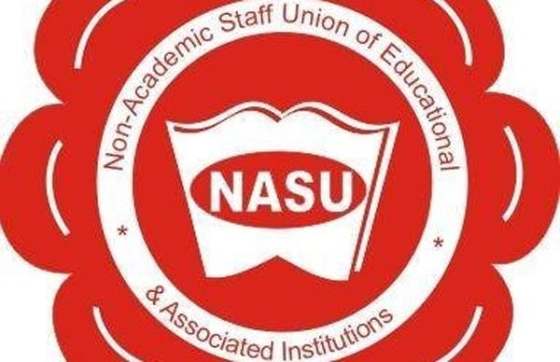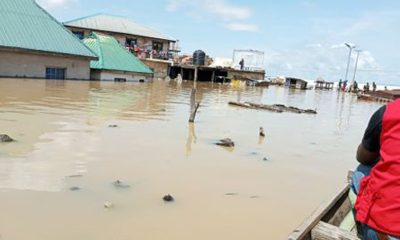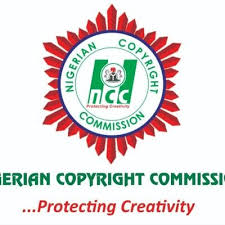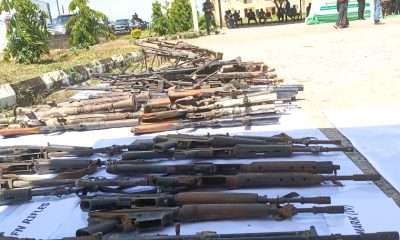OPINION
Politics as the Fourth Factor of Production

By Majeed Dahiru
The advent of the industrial revolution in the 18th century in the United Kingdom, continental Europe and the United States of America, established land, labour and capital as the primary factors of production. While land included natural, mineral and water resources above and beneath it, capital essentially referred to money, the legal tenders or any other means of exchange, and labour was the work force deployed to till, mine and cultivate the land, as well as oversee the proper utilisation of capital.
But of the three primary factors of economic production, labour is the most important.Although interdependent of each other, and with none dispensable, labour is needed to convert the enormous potentials of land to satisfy wants, just as it is the fruits of labour that is converted into capital, to keep the wheel of production grinding.
Labour is the most important factor of economic production because while capital and land are inanimate, labour is animate in its primary form as a human activity that utilises the other two factors to satisfy human wants and needs accordingly.While the industrial revolution transformed the course of human economic activities for better, the invention of machines and its substitution of manual labour tended to undermine the importance of labour in the early stages of the industrial age. Armed with enormous capital and equipped with machines, the emergent class of industrial capitalists, like slave masters before them, exploited labour to the maximum, without commensurate benefit.
It was out of the chaos of the early stages of the industrial revolution, which was characterised by poor wages, exploitation, poor working conditions and everything that could be categorised as unfair and unethical labour practices, that the organised labour movement emerged.
As a means of collective bargaining, workers, traders and artisans organised themselves into unions to replace the pre-industrial era guilds, to engage with both public and private employers for better working conditions. Beginning in 18th century Britain, strike actions were embarked upon by workers to press home their demands for fairer labour practices and improved working condition by the organised labour movement.
Industrial disagreements between capitalists and their workers soon triggered a class struggle, with society being organised along the lines of the owners of capital – the bourgeoisie and the workers – the proletariat. It was this class struggle that incubated a new ideological framework for the political economies of the newly industrialised nations of the world to challenge what was being denounced as capitalism.
The proposed alternative framework was the ideology of socialism. It was this ideology that saw the labour movement transformed into social democratic movements and eventually resulted in the formation of organised labour backed political parties.
Beginning with the formation of the Labour Party in the UK from an amalgamation of the Trade Union Congress of England and Wales with other elements of the organised labour movement in 1900s and the rise to eminence of the Bolshevik faction of the Social Democratic Party of Russia in 1903, organised labour all over the industrial world no longer sat on the sidelines as perpetual spectators in the game of partisan politics of democratic leadership recruitment.
This was so because as the most important factor of production, labour could no longer concern itself with just negotiating for its slice of bread with butter. The organised Labour movement, as matter of self-enlightened interest, decided to get involved in the baking of the bread and the preparation of the butter, in order to be in a better position to get a more satisfying slice.
By 1917, the Bolsheviks led by Vladimir Lenin rode to power on the back of the Russian revolution and the Labour Party of UK formed its first democratic government in 1924, with Ramsay McDonald as Prime Minister when it won the majority seat in the British parliament.
These labour-centred parties and others like them all over the world, successfully incorporated the ethos of social democracy in the politics of their respective nations, and mainstreamed the charter of demands of the organised labour movement in ways very profound, and which have largely resolved the existential problems of the financial inadequacy, inequality and insecurity of their members.
A vital lesson to be learnt from the transformational experiences of organised labour movements into political parties was that whilst it is true that labour is the most important factor of production, politics as the fourth factor of production was far more important.
Bringing this nearer home, the organised labour movement can no longer seat on the side lines as mere spectators in the politics of democratic leadership recruitment in Nigeria. The time is right for the labour movement in Nigeria to stop agonising over its inadequate bread and butter and must begin to organise to get involved in the process of baking a bigger loaf of bread, from which it can get an adequate slice for its members.
The scope of labour as a factor of economic production transcends mining, manufacturing, academia and manning the military-industrial complex, to the politics of democratic leadership recruitment. Since the transition from military to civil democratic rule in 1999, the organised labour movement in Nigeria has remained largely aloof and detached from matters of partisan politics to the detriment of the course of good governance in Nigeria.
The reason for the existence of a modern democratic nation-state must be more economic than political – the economics of production and not politics of consumption. And for a democratic nation-state to be able to provide security and welfare to its people, its politics must be primarily driven by the economics of production. This is so because no nation on earth is really endowed with abundant human and natural resources.
At best, nations are only endowed with enough natural and human resources, and they must necessarily look beyond their borders to shore up their resource bases through developmental immigration and overseas trade and investment. The most export competitive nations are those whose internal political processes are predicated on the economics of production and not those who economies are predicated on politics of consumption.
Unfortunately, the democratic Nigerian state exists more for the politics of consumption and less for the economics of production. This is sadly so because its politics is primarily driven by ethnic and religious sentiments, rather than economic common sense.
This is also because at the inception of the Fourth Republic, the organised labour movement in Nigeria, which is the most important economic interest group in the country, left partisan politics to ethnic champions and religious bigots, who imposed identity politics as the major driving force of Nigeria’s democratic leadership recruitment process.
And with an elaborately corrupt patronage system as the main reward for identity politics, the attendant financial haemorrhage is what has driven Nigeria broke and unable to pay living wages to its workers, to provide health care and decent housing for its people.
To effectively transform Nigeria from a consumption economy into a productive one, the organised labour movement will have to step out of the side lines into the main arena of partisan politics by harmonising its charter of demands into a concise peoples manifesto for national rebirth and democratic redemption from identity politics, with patronage as the reward system for a privileged few, to an economics driven politics, with good governance as reward for all.
However, to effectively transform Nigeria from consumption to production economy, the government can no longer hands off the means of production to private individuals alone. The neoliberal concept that seeks to keep government out of the means of production under the guise of “government has no business in business” is a proven fallacy that must be rescinded if not repudiated by the organised labour movement and insist on a new political economic philosophy that states that “government has business in business” because the main purpose of government is doing business and any government that cannot do business has no business being in government.
Dahiru, a public affairs analyst, writes from Abuja and can be reached through dahirumajeed@gmail.com.
OPINION
Rivers Crisis: How Fubara Can Resolve Stalemate without Firing Shot
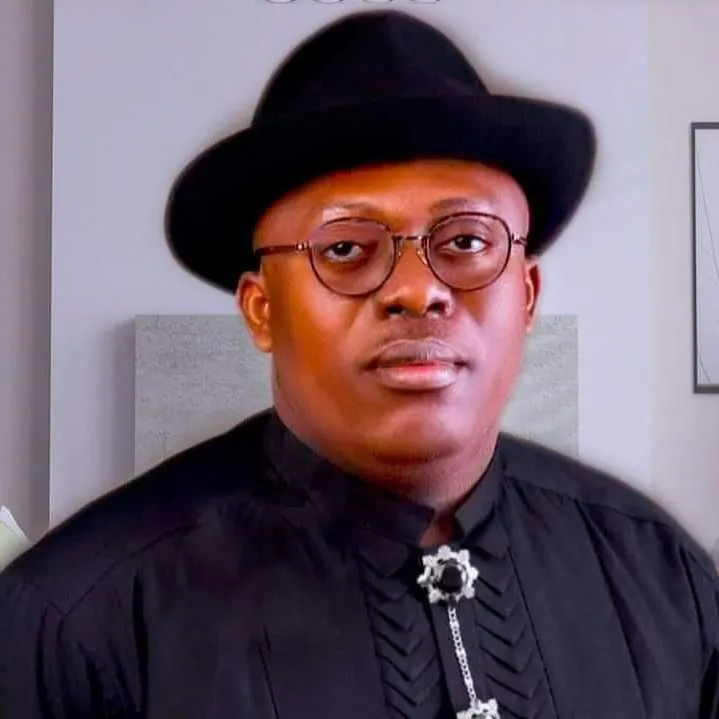
By Ehichioya Ezomon
Rivers State Governor Siminalayi Fubara’s made the world to believe that his predecessor and Minister of the Federal Capital Territory (FCT), Abuja, Chief Nyesom Wike, is the architect and purveyor of the political crisis in the state. He’s used every opportune moment to drum this narrative for the consumption of a sympathetic public.
Fubara struck a similar cord lately, at the heat of the contentious and bloody October 5, 2024, local government council election that’s resisted and boycotted by the Wike faction of the ruling Peoples Democratic Party (PDP), and the opposition All Progressives Congress (APC) in the state.
Appearing on a Channels Television’s ‘Politics Today’ on Monday, October 7, Fubara advised Wike to let go of his grip on the Rivers polity, “for the sake of the good people of Rivers State, and the love that you (Wike) have always professed for the state.
”On the alleged breach of a “gentleman’s agreement” he’d entered into with Wike to secure his “anointing and endorsement” as the PDP candidate for the March 18, 2023, governorship, Fubara said he’d kept all “understanding” with Wike, and lounged into his talking point of how he’d repeatedly knelt down for Wike for peace to reign in Rivers.
“There is nothing I have not done on this earth for peace to reign. I can tell you the number of times I have knelt to beg (Wike) that, let’s allow this issue to go. I have done everything,” Fubara said, even as continuously states, “I will not worship any human being but God” – indicating alleged Wike’s demand he (Fubara) should worship him, a charge Wike’s denied.
Fubara says he appreciates the fact that Wike played a pivotal role in his governorship, but that it’s God that used Wike as a vessel to fulfil His purpose, and so, only God deserves his (Fubara’s) worship, and not any human. He echoed this sentiment on May 16, 2024, during the inauguration of Egbeda internal roads, in Emohua local government area of Rivers.
Fubara said: “God can do anything He wants to do when He wants to do it. It is only for us to realise that God will not come down from Heaven but will pass through one man or woman to achieve His purpose. So, for that reason, when we act, we act as humans; human vessels that God has used, and not seeing yourself as God.
“I want to say this clearly, that we appreciate the role our leaders, most especially the immediate past governor (Wike) played. But that is not enough for me to worship a human being. I can’t do that.”
However, on May 11, 2024, in Ogu-Bolo, Rivers State, at a grand reception in honour of Chief George Thompson Sekibo for his 20 years of public service, Wike said he isn’t God, and as such, had never demanded that anybody should worship him. “Nobody can worship man. All of us believe that it is only God we will worship. (But) as politicians, we appreciate people who have helped us,” Wike said.
Asked on the Channels TV’s programme what his message to Wike would be if they met, Fubara said: “I’ll tell him that it has gotten to a point where he needs to let go. We need peace in this state. You don’t necessarily need to win all the fights; at times, you just let go for the sake of the good people of Rivers State and the love that you have always professed for the state.”
Noting that “election periods are over and it’s time for governance,” Fubara urged Wike to give peace a chance. “What I am appealing is: Everyone should sheathe their swords. Even to the Minister, my oga (my boss), there is no need to destroy this state. When it comes to the election period, you can fight and do whatever but now is the time for governance. We need all the support,” Fubara said.
“He (Wike) once ruled this state and the state was an envy of every other state. Another person (Fubara) is there now, (and) what we need is the support. After four years or eight years, who knows? I will also leave and someone else will take over. That should be the spirit. Fubara will leave tomorrow. Who knows who is going to come? It might be through him or another person but we need to secure the state.”
But does Fubara really desire peace in Rivers State? It doesn’t seem so! Otherwise, he should quit the baiting, the insulting, the denigrating, the rhetoric, and the labelling of Wike as “the enemy of Rivers State” – all done by Fubara to curry sympathy and secure the approval of the gaming public. You can’t be talking peace and at the same time be fanning the embers of war!
Fubara can stoop to conquer by embracing genuine reconciliation with Wike. For instance, what stops the governor from telling those beating the drums of war for him that, “Enough is enough, I’m going to make peace with Wike for the sake of Rivers State and its people?”
This may not work due to the personal and partisan differences among the former governors and the incumbent. For example, Odili aligns with Fubara and alienates Amaechi and Wike; Amaechi’s sours on Odili, Wike and Fubara; Wike’s beef with Odili, Amaechi and Fubara; and Fubara and Wike are on a war path.
In such a scenario, who’ll call for the “sit-at-table” peace meeting? President Bola Tinubu would’ve fitted the bill, but he literally burnt his fingers the last time he attempted a truce between Fubara and Wike. The agreement, witnessed and signed by Odili, Fubara and Wike, among others, collapsed almost immediately it’s hashed out, with Fubara, who initially said the agreement “wasn’t a death sentence,” turning round to lebel it as political and not constitutional.
So, here’s a simple approach that’ll not only put Wike on his back foot, and induce him to return to the basic, but also push him to his wit’s end! Fubara should select some of the elders and leaders of the divide in Rivers, including the former governors, and inform Wike that he’s coming with a delegation on an agreed date, to fully reconcile with him. The ball will then be centrally placed in Wike’s court to either accept or refuse Fubara’s expressed desire for armistice between them.
Fubara’s offer of peace should be widely publicised in the media – different from his claimed behind-the-scences kneeling down to beg Wike – for maximum pressure and effect on Wike, and it’ll be well and good if the overture comes through! If doesn’t – in the event that Wike declines the invitation to reconcile, his current and intended political antics will be exposed as being the real masquerade behind the political turmoil in Rivers State, and Fubara will be vindicated at last.
All told, the “feat” Fubara achieved with the conduct of the local government council election hasn’t guaranteed a win over the war with Wike. Instead, he’s merely won the battle – a pyrrhic victory of some sorts – while the war remains. It’s still a dicey situation in which “a child doesn’t know when sleep takes food from their mouth” – depicting the futility of the “clever person” attempting to hold on to something that’s slipping away from them.
Fubara strives strenuously to exonerate himself from the crisis he’s helped engineer and sustain for a year now. That Rivers is going through the grinding mill is because of the governor’s failure to use tact and diplomacy in handling and dealing with Wike’s alleged overbearing influence on his government.
Agreed that Wike – amid strong opposition and resistance from even political leaders from Fubara’s homestead – worked on the recommendation of some Rivers leaders, and took Fubara from the civil service to the Government House, for which Fubara should be grateful, and accord Wike the respect he deserves within the ambit of personal relationship and official conduct.
Reciprocally, Wike should give Fubara the space to freely run his government, and not breath down his neck, as doing so portrays him as a “godfather” that exerts maximum loyalty from and punishment on their surrogates. That’s what Wike’s become, and as especially sold by Fubara to the public, which views the governor as the underdog, and backs his duel with Wike in the supremacy contest to control the political structure, power and resources of Rivers State.
But in his quest to crush and humiliate Wike over his appetite for “godfatherism,” Fubara’s committed numerous unforced errors, as he listens and tries to satisfy his supporters, who pressure him to man up and “show Wike that you’re the Governor of Rivers State.” It’s time Fubara ditched their selfish advice, and chart a different course that’ll genuinely ensure peace and security in Rivers!
Ezomon, Journalist and Media Consultant, writes from Lagos, Nigeria.
OPINION
Humphrey Nwosu as Compass for Electoral Reforms
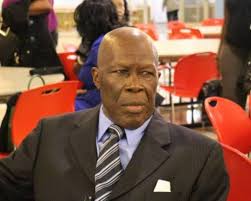
By Taiwo Adisa
One of the major actors in the June 12, 1993 election debacle, Professor Humphrey Nwosu, breathed his last on Thursday, October 24, in the United States of America, at the age of 83. He had served as the Chairman of the National Election Commission (NEC), now the Independent National Electoral Commission, between 1989 and 1993, his tenure terminated by the fiendish exchanges occasioned by the savage annulment of the election.
Professor Nwosu was a Professor of Political Science who was named the Chairman of the electoral body by former military leader General Ibrahim Babangida in circumstances similar to how former President Goodluck Jonathan named Professor Attahiru Jega into that same position on June 8, 2020.
Both IBB and Jonathan had previously not met with the men they named as the nation’s chief electoral officers. Nwosu served creditably, even though the military denied the nation the fruits of his service as NEC Chairman.
While in office, he was the executor of Babangida’s transition as it galloped from one bumpy end to another. The man was, however, determined to get something out of the assignment. He showed he was in office and in power in his determination to improvise a model into practical life mechanically.
He left no one in doubt that he was out to give back to the country of his birth from the pool of the political theories he had read and taught in the university. Working in the shadows of Babangida’s Political Bureau Report, which was the foundation of the regime’s unwinding transition programme, Nwosu applied his theoretical craft and modelled the Option A4 (Open Ballot System) and the Modified Open Ballot System.
With IBB’s regime having adopted a two-party system, it seemed a perfect fit for the elections and the results turned in at different intervals to the satisfaction of Nigerians. There was the local government election, state elections and then the National Assembly elections. At a stage, the nation was treated to a Diarchy, with a full-fledged National Assembly making laws for a military ruler. Everything looked set for the June 12, 1993, presidential poll, which was to crown a tedious transition programme that started in 1986.
Nwosu was upbeat that the law was on his side, despite the serpentine spirit donned by the infamous Association for Better Nigeria (ABN) of Senator Arthur Nzeribe and Abimbola Davies, lurking. Nwosu was prevented from announcing the presidential election in full, as the regime cited a midnight judgment secured by the ABN. Even at that, the whole nation was merely awaiting the official confirmation of what they already knew, Chief MKO Abiola, candidate of the Social Democratic Party (SDP) had defeated Alhaji Bashir Tofa of the National Republican Convention (NRC).
It was an election globally confirmed as the freest and fairest in the nation’s history but the Babangida junta denied Nwosu the accolades, it denied Chief Abiola the chance to savour his victory and drew back the hands of Nigeria’s democratic clock.
For years, Nwosu kept mute on the circumstances that surrounded the testy period of the annulled election but in June 2008, he spoke to TheNEWS magazine, just ahead of the public presentation of the book that chronicled his public service experience. He first told the magazine that he had a sense of history when the appointment fell on his lap and that he believed there was a need to produce a practical situation from the theories.
He said: “I felt I had to do my best to this nation to also convince the person who appointed me that I could do my best for Nigeria and satisfy my conscience and my constituency-the university community. You know, when members of the academic community are given a public assignment; people say they’re just talking theory and that you have to blend theory with practice.”
He described the June 12, 1993 election as a special moment in the nation’s history and said: “So you’ll find that June 12 as a movement was indeed the day Nigerians opted for a democratic political order. They didn’t care, and the parties cut across ethnic, state, and regional boundaries. And Nigerians were highly mobilized and they expressed their choices freely without interference. There was no stuffing of ballot boxes, and there was no manipulation, intimidation, or harassment. Nigerians came out as a body, just like people in the United States and Britain, and voted freely. No intimidation, no one lost his life anywhere, it was God-ordained.”
Indeed, the annulment of the election, which was announced by Babangida on June 23, 1993, was like a prison sentence for Nigeria’s democratic process. Alarm bells rang across the nation. There were threats of war. Many died. Many got maimed and countless went missing as protests engulfed the nation. The nation was on tenterhooks for years. With Nigeria on the brink of disintegration, power changed hands quickly.
General Sani Abacha replaced the Ernest Shonekan contraption left by a “stepping aside” General Babangida. He initially dangled the carrot before the political class but later unleashed his iron-fisted fangs. He battled the pro-democracy agitators with crude despotism. MKO Abiola, who had declared himself president, was arrested, and his wife Kudirat was killed, just as many top pro-democracy campaigners.
No doubt, the aftermath of the annulled June 12 was a broken regime and a fractured nation, culminating in the birth of a wobbling democracy. Democracy in its true form, having been dented with hefty blows in the series of leadership change from Babangida to Shonekan to Sani Abacha, whose death in 1998 paved the way for General Abdulsalami Abubakar to midwife the current Republic within eleven months.
As stated by Nwosu above, most of the kudos for the turnout of the June 12 election were largely due to his modelling efforts. He fashioned out Option A4, which ushered in the freest poll in the annals of Nigeria’s elections. In the interview published by The NEWS, Nwosu justified the decision by the Babangida administration to adopt a two-party structure and declared that a multi-party system would not yield the desired democratic objectives. He said that mushroom political parties cannot defend democracy as they would not be able to muster the structure across the country.
With what we have seen in recent years, Nwosu was right. Though the late Chief Gani Fawehinmi, SAN, had fought for the democratisation of the political party registration process, the fact remains that the multiplicity of parties may not necessarily serve the democratic cause. These days, many political parties are there for political jobs. They either withdraw in favour of the highest bidder a few days before the election, or they are the first to address the media to endorse the outcome of elections, all for a fee.
Incidentally, Prof Nwosu had recognised such shenanigans long before his demise and had equally recommended a revisit of his electoral models. He told TheNEWS: “I feel we should revisit the electoral reforms, modified open ballot system and option A4. We should go back to the two-party structure. We may even allow a third party for those who feel they cannot be accommodated in the two.
You could see in the days of SDP and NRC that you can have integrated parties that look to value consensus, parties that raise national consciousness, parties that have spread all over the country, and parties that cut across ethnic, and religious groupings. I am seriously addressing this issue because I believe in it, and I think that some Nigerians believe in it.”
In this era of troubled elections, I believe that Nwosu’s models should be revisited. His Option A4 should serve as our electoral compass going forward. The modified system and all that Nwosu brought to the table needed to be re-examined by the National Assembly, such that they could give the nation an electoral law that would work for all.
OPINION
Mr President, a Board for NCC

By Okoh Aihe
On this very day, I want to acknowledge with utmost respect that there could be so many items on President Tinubu’s plate, so I do not, by any means, want to add anything to that mix which could give even an elephant a headache. Uneasy lies the head that wears a crown, they say.
Looking around the nation daily, the President will have enough worries to last a lifetime, any addition could fall below acceptable standards of patriotism, albeit outright wickedness.My self-appointed mission this Wednesday is to help alleviate the President’s headache by pointing to a task that needs to be sorted urgently in order to help realise his administration’s growth projections, just like actually adding to the items on the plate, with a caveat: the newest item needs accelerated treatment.
If words haven’t reached the President yet, I have taken it upon myself to notify him that the Nigerian Communications Commission (NCC) needs his accelerated attention in order to save the entire telecommunications industry, not only the regulator this time, from looming disaster. The regulator is in dire straits and needs urgent constitution of its Board so as to steer it back to the path of reason and performance.
The Nigerian Communications Act 2003 credits the President with the responsibility to appoint a Board for the NCC. This is stated in Section 5 of the Act which says that all the 9 Commissioners shall be appointed by the President of the Federal Republic of Nigeria. The Board shall consist of a Chairman, a chief executive who shall also be the Executive Vice Chairman, 2 Executive Commissioners, and 5 non-executive Commissioners.
The Act further states that Notwithstanding any other provision of this Act, the President shall ensure at all times that there is a duly constituted Board of Commissioners and that there are a minimum of 6 serving Commissioners on the Board at any and all times, made up of – the Chief Executive; 2 Executive Commissioners; and 3 non-executive Commissioners.
In addition, the Commissioners shall be persons of recognised standing, qualification and experience in one or more of the following fields – finance or accounting; law; consumer affairs, telecommunications engineering; information technology, engineering generally; economics; and public administration. They shall be drawn from the 6 geo-political zones subject to the confirmation by the Senate.
Flowing from the foregoing, it is safe to observe that the NCC has not had a Board for over a year even though the Act says that “the Board shall have capacity to make standing orders for the regulator of its proceedings and meetings however, and acts of the Board shall be deemed to be acts of the Commission.”
The Board gives the general direction for the Commission and provides it with a buffer or safety net from the predatory capacity of higher authorities. Unfortunately and quite ironically, the absence of the Board denies the Commission of the variegated experiences of industry elders, scuppers its capacity for high-wired relationships and even the capacity to perform its basic functions. This has not placed the NCC in a good position, leading to aggravated hopelessness and tension within the system. For a regulator, this is almost a death call and gives reason for serious worry.
So, for the NCC, the Board is everything. Under Engr Ernest Ndukwe who initiated the rhythm for telecommunications growth in Nigeria, the Board was headed by former civil servant and compact genie, Alhaji Ahmed Joda. He could walk in any time to see President Olusegun Obasanjo in the Villa and make his demands. In the days of Dr Eugene Juwah, who answered the final call in October 2021, the Board was headed by Mr Peter Egbe Igho, a former Permanent Secretary, demure but also had his ways. During the time of Prof. Umar Garba Danbatta, the Board was headed by Chief Olabiyi Durojaiye, venerated lawyer and former Central Bank Director, a pro-democracy activist and a Senator of the Federal Republic of Nigeria.
At his age, he was enthusiastic about the Commission but was harassed out of office in contravention with the provisions of the Act by former Minister of Communications and Digital Economy, Dr Isa Pantami, and his collaborators, who immediately activated his gameplan to appoint his lackey, Prof Adeolu Akande, who was NITDA Chairman at the time Pantami was Director General.
Immediately, the NCC suffered jeopardy. The Board adorned the costumes of a puppet and couldn’t even take simple decisions without the imprimatur of the Minister. Even staff promotions that was the prerogative of the Board was remotely superintended. All the gains made in over two decades were ruined by the ignorance and presumptions of a Board that failed to reconcile its activities with the provisions of the Act and the aspirations of the workforce. It was an apocalypse for the NCC which has not been able to fight its way out of such misbegotten fate.
A Director, who didn’t want to be named, summarised the situation as follows: “The last Board was more of procurement officers, no experience. Their meetings were about contracts. The only good Board under the last administration ended with the sacking of Senator Durojaiye.”
Mr President, the NCC needs a Board. Urgently. Somebody around you could say, you appointed two Executive Commissioners in February this year, in the persons of Engr Abraham Oshadami, Technical Services and Rimini Makama for Stakeholder Management. Without revisiting the incongruity of the appointment of the latter, let me point out that the appointment of two Executive Commissioners with the Executive Vice Chairman (EVC), Dr Aminu Maida, only provides an Executive Management and not a Board.
The Board always reserved a place for experience and institutional knowledge or memory, which are in deficit at the moment. Only Oshadami offers that capacity and the other two were appointed from ancillary industries sans core experience in telecoms operations.
In this column this writer wrote on February 28, “Maska, who yielded grounds for Oshadami to step in, was homegrown, just like his successor. They epitomise the lore of the regulatory institution which often provides the compass for the regulator to steer the industry. After a troubling period of regulatory capture under the Muhammadu Buhari administration, the regulator needs a genuine reload for the challenges and excitement ahead.”
At the moment, there is no reload at NCC. Instead, the stories we hear from that place are intemperate languages, scheduling of appointments to see a coworker in the form of an executive commissioner, or even a general disdain for the tradition of the institution which thrived on love and great interpersonal relationships. All the good memories at the institution have nearly been wiped by some level of cockiness and uncouth behaviours that make the office environment toxic.
The President must act fast to stem the drift at the NCC which at the moment is not in a good place. Apart from the internal rancour and apprehension, this writer gathered that the regulator has lost so much steam and respect that some operators are resorting to higher authorities to meet their regulatory needs. This never happened at NCC and doesn’t portend good for the Commission. It doesn’t also portend good for a nation that once produced one of the best regulatory agencies in the world.
Apart from the most recent Board which nearly damaged the Commission, previous Boards were resolute in tackling the challenges of the regulator. The times demand that the President constitutes a Board peopled with men and women of sterner stuffs, people cast in the similitude of Joda and Duroaiye (both of them have returned to their Maker with good reports) who could look at the President in the face and make demands that can reposition the telecommunications industry or argue about funds that must be retained by the regulator. Joda did that always.
And there are so many things the Board should be talking about. For instance, this writer is aware that there is a lot of disgruntlement about the 50 percent which the Government collects from the Annual Operating Levy (AOL) which operators pay to the Commission. From the balance, the Commission, a source informed, will still have to fund the Universal Service Provision Fund (USPF), Nigeria Data Protection Commission (NDPC) and even some of its own activities. This development has left the NCC in rags and in tatters and has rendered the agency incapable of carrying out even some key functions like monitoring – to ensure operators are not carving out little empires for themselves outside the law.
Mr President, the NCC needs a strong Board to tackle its internal crisis and manage other stakeholder expectations, and also be able to confront you with challenges of the industry where exigent interventions are required of your esteemed office.
The importance of the industry rests on the evaluation of one Director who reasoned that “Telecom is the platform on which other organisations run. Nobody wants to watch that industry die.”

